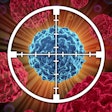CHICAGO - Radiation therapy alone can reduce prostate-specific antigen (PSA) levels below detectable amounts in prostate cancer patients, researchers from Fox Chase Cancer Center in Philadelphia reported at the American Society for Radiation Oncology's (ASTRO) annual meeting being held this week in Chicago.
The research indicates that patients who have an undetectable level of PSA after therapy have less chance of biochemical failure than other prostate patients, and a good prognosis regardless of their age.
Prostate cancer patients who have a radical prostatectomy are expected to have undetectable PSA levels, but patients treated with radiation therapy alone may still have viable prostate tissue after treatment because the radiation beam used is narrowly focused on the tumor.
Dr. Eric Horowitz, clinical director of oncology, and colleagues conducted a retrospective study to determine if prostate cancer patients treated with 3D conformal radiotherapy or intensity-modulated radiation therapy (IMRT) who achieved undetectable post-treatment PSA had a better biochemical and clinical outcome than patients who did not.
The researchers analyzed the patient records of 1,330 men treated with radiation therapy alone between 1989 and 2005 at Fox Chase Cancer Center. The median follow-up was 74 months, with a range of one to almost 18 years. One hundred fifty-four patients, or 12%, achieved undetectable post-treatment PSA at a median of 32 months.
These patients were 59% less likely to have biochemical failure than men who had detectable PSA after radiation therapy, according to Horowitz. At seven-year follow-up, 6.7% of the patients with undetectable PSA had biochemical failure as compared to 18.9% of patients with detectable PSA levels. The risk of distant metastases was also lower, at 0.9% as compared to 3.3%.
Although long-term cure rates at 10 to 20 years after treatment are unknown, the findings from this study may provide reassurance to younger patients with prostate cancer who prefer an alternative to surgery, Horowitz said.
Related Reading
SBRT for early prostate cancer shows promising interim results, April 9, 2009
High-dose radiotherapy cuts risk of prostate cancer recurrence, September 4, 2005
Copyright © 2009 AuntMinnie.com



















